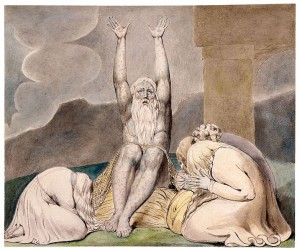1) Faith is essential to the Christian life. Unfortunately, many Christians also believe that doubt is the antithesis of faith. Therefore, unnecessary anxiety is experienced by many perplexed or puzzled Christians; young believers are scolded or rebuffed for having critical questions. Many problems are generated by a deficient view of faith which defines it a blind, unthinking trust generated by an act of pure will. On this view, the slightest doubt on our part indicates a failure of the will; we just need to believe harder if we are to please Jesus.
 In fact, Jesus never demanded this kind of faith. When Jesus rebuked his disciples for their lack of faith was he essentially saying, “Even though you have good reason to be sceptical, you should just believe in me blindly”? Hardly! A common theme in the Gospels is that disciples are very slow to grasp who Jesus really is despite all the evidence available to them. Consider the story of doubting Thomas in John 20. Thomas is absent when the risen Jesus appears to his disciples. Not only had Thomas plenty of evidence for who Jesus was, but he also had the evidence of the empty tomb and eyewitness testimony of Jesus’ resurrection from many disciples. We miss the point of this passage if we forget that Thomas’ scepticism is unreasonable!
In fact, Jesus never demanded this kind of faith. When Jesus rebuked his disciples for their lack of faith was he essentially saying, “Even though you have good reason to be sceptical, you should just believe in me blindly”? Hardly! A common theme in the Gospels is that disciples are very slow to grasp who Jesus really is despite all the evidence available to them. Consider the story of doubting Thomas in John 20. Thomas is absent when the risen Jesus appears to his disciples. Not only had Thomas plenty of evidence for who Jesus was, but he also had the evidence of the empty tomb and eyewitness testimony of Jesus’ resurrection from many disciples. We miss the point of this passage if we forget that Thomas’ scepticism is unreasonable!
2) “Faith” simply means “trust”: a personal commitment to a person, institution or set of ideas. Faith goes beyond mere belief that some statement is true; it implies that we are willing to act on the basis of our belief; that we are prepared invest something in that object, person or institution. Christianity demands total trust Christ to reconcile us to God. In other words, we must invest every aspect of our life: we must be practically, emotionally, even existentially invested in him.
3) To some extent, we must also be careful to define exactly what we mean by “doubt”. To be fair, sometimes the word “doubt” can be used to denote scepticism. And, of course, one cannot have faith in God if one is a total sceptic about his existence! But that is not what the vast majority of Christians mean when they say they are experiencing doubt. Nor is their “doubt” an agnostic state, half-way between belief and unbelief.
 4) Faith implies a personal investment. Discovering that our faith has been placed in the wrong person, cause or project implies that we will suffer some personal cost. Christian faith means investing an entire life – hope, dreams, ethics and values are all tied up in who Christ is. Given that faith in Christ is total, many Christians sometimes feel anxiety – how can they be assured that they have made the correct investment? Furthermore, like belief, faith can be irrational or rational; it can be based on appropriate evidence or it can be naïve. Many Christians simply wish to be reassured that their faith is sensible.
4) Faith implies a personal investment. Discovering that our faith has been placed in the wrong person, cause or project implies that we will suffer some personal cost. Christian faith means investing an entire life – hope, dreams, ethics and values are all tied up in who Christ is. Given that faith in Christ is total, many Christians sometimes feel anxiety – how can they be assured that they have made the correct investment? Furthermore, like belief, faith can be irrational or rational; it can be based on appropriate evidence or it can be naïve. Many Christians simply wish to be reassured that their faith is sensible.
5) So the Christian’s doubt is not evidence of a lack of faith. Doubt is simply evidence that the Christian would like some assurance that her beliefs are true. In fact, the Christian with passionate faith is more likely to experience doubt than the tepid believer, who does not really grasp the monumental importance of Christianity. Doubt is like pain; unpleasant when you feel it, but at least you know you’re alive. Doubt is just a consequence of human frailty and quite often provides the opportunity to develop strength and endurance.
6) A simple example illustrates that doubt and faith are compatible. Consider a student sitting an important exam. She passionately wants a good grade, has studied hard, and gives what she believes to be the correct answer to every question. Once she has answered the paper it is sent away for marking; and, typically, this is when most students experience doubt. She has written what she believed to be correct; she acted on her beliefs, had faith in what she had revised. But what if her beliefs were not true? The more that student wants to pass her exam, the greater her anxiety will be; a student who has little invested in the course will not lose much sleep over his result.
 7) Sometimes a person might doubt that he has faith: how can he tell for sure? He should not examine his feelings to see how strongly he believes! [1] God does not require a certain amount of faith. Jesus performed miracles for those who had faith in him; that included disciples like Peter and Thomas and the man who cried “Lord, I believe! Help thou my unbelief!” Jesus never rejected those of little faith! In any case, we can doubt just about any of our feelings when we engage in morbid self-examination. “Do I really value x as a friend, or am I kidding myself?”; “do I really like author y or sport z, or am I just following a crowd?”
7) Sometimes a person might doubt that he has faith: how can he tell for sure? He should not examine his feelings to see how strongly he believes! [1] God does not require a certain amount of faith. Jesus performed miracles for those who had faith in him; that included disciples like Peter and Thomas and the man who cried “Lord, I believe! Help thou my unbelief!” Jesus never rejected those of little faith! In any case, we can doubt just about any of our feelings when we engage in morbid self-examination. “Do I really value x as a friend, or am I kidding myself?”; “do I really like author y or sport z, or am I just following a crowd?”
So how can you know if you have faith? Trust is an action; faith in Christ implies a changed life. Or, if one came to faith at a young age, faith implies that one’s life would be very different without Christ in it. So, if you have faith in the son of God you will have distinctive beliefs about him; you will believe that, in the beginning, he was with God and was God. If you trust Christ you will try to live your life in a way that would please him. If someone asked you “why would God let you into his kingdom?” you could only answer “Jesus loves me and died for me”. That is how you know you depend on him.
8 ) Doubt can be cured by examining the evidence for Christianity ( and be assured the Christian world-view is at least as rational as any of its competitors.) But it is worth keeping in mind that spiritual doubt can be caused by simple exhaustion and stress. A person can be so burned out that his mind races to every anxious conclusion and his heart jumps at every shadow of a doubt. In that state, just about any problem will cause him a disproportionate amount of worry – including intellectual problem about his deepest beliefs. A person in that position will gain something from apologetics – but the priority is rest and healing.
) Doubt can be cured by examining the evidence for Christianity ( and be assured the Christian world-view is at least as rational as any of its competitors.) But it is worth keeping in mind that spiritual doubt can be caused by simple exhaustion and stress. A person can be so burned out that his mind races to every anxious conclusion and his heart jumps at every shadow of a doubt. In that state, just about any problem will cause him a disproportionate amount of worry – including intellectual problem about his deepest beliefs. A person in that position will gain something from apologetics – but the priority is rest and healing.
It is also worth reflecting on other reasons for faith: that the gospel answers our deepest spiritual and personal needs; that God gives relief from tragedy and anguish; and that the message of the scriptures makes sense of this world and its creator. These are excellent reasons and one does not need academic qualifications to understand them. All that is needed is a little patience and wisdom.
 [1] It is worth considering Calvin ( Institutes Book 3 Chapter 2 Section 4) on the frailty of faith:
[1] It is worth considering Calvin ( Institutes Book 3 Chapter 2 Section 4) on the frailty of faith:
God keeps us modest, assigning to each a measure of faith, that every teacher, however excellent, may still be disposed to learn. Striking examples of this implicit faith may be observed in the disciples of Christ before they were fully illuminated. We see with what difficulty they take in the first rudiments, how they hesitate in the minutest matters, how, though hanging on the lips of their Master, they make no great progress; nay, even after running to the sepulchre on the report of the women, the resurrection of their Master appears to them a dream. As Christ previously bore testimony to their faith, we cannot say that they were altogether devoid of it; nay, had they not been persuaded that Christ would rise again, all their zeal would have been extinguished. Nor was it superstition that led the women to prepare spices to embalm a dead body of whose revival they had no expectation; but, although they gave credit to the words of one whom they knew to be true, yet the ignorance which still possessed their minds involved their faith in darkness, and left them in amazement. Hence they are said to have believed only when, by the reality, they perceive the truth of what Christ had spoken; not that they then began to believe, but the seed of a hidden faith, which lay as it were dead in their hearts, then burst forth in vigor. They had, therefore, a true but implicit faith, having reverently embraced Christ as the only teacher. Then, being taught by him, they felt assured that he was the author of salvation: in fine, believed that he had come from heaven to gather disciples, and take them thither through the grace of the Father. There cannot be a more familiar proof of this, than that in all men faith is always mingled with incredulity.
